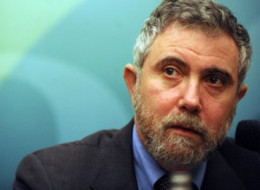Friday, December 4, 2009
It's Over?
Yes, inventories are being drawn down and yes stimulus dollars have driven much of this. But in Canada in particular, stimulus dollars will continue to drive growth and our energy sector will underpin growth as world demand increases.
As Krugman notes today, however, the danger is now that stimulus efforts will be curtailed or even rolled back as a free-market government here and a timid one in the U.S. switch their focus to an as yet non-existent threat to inflation.
Thursday, December 3, 2009
Munk Debates
I would recommend that you watch it, and I hope to have comments over the next few days. To my mind, the most valuable contribution of the debate was to underscore the need for a balanced response to those who would seal off debate, dictate policy and shout down all dissenters. In particular, Bjorn Lomborg offered a thoughtful approach that bears much closer scrutiny. I am picking his book up this afternoon and hope to have more on it later.
Academic Thuggery -- Part 2
Earlier this year, the NYT magazine ran an article by Nicholas Dawidoff titled The Civil Heretic describing the heir to Einstein's chair at Princeton's concerns with the climate change consensus.
This past Sunday, Times science columnist John Tierney ran a piece looking at the damage done when scientists fiddle with the data, noting that
I’m not trying to suggest that climate change isn’t a real threat, or that scientists are deliberately hyping it. But when they look at evidence of the threat, they may be subject to the confirmation bias — seeing trends that accord with their preconceptions and desires. Given the huge stakes in this debate — the trillions of dollars that might be spent to reduce greenhouse emissions — it’s important to keep taking skeptical looks at the data. How open do you think climate scientists are to skeptical views, and to letting outsiders double-check their data and calculations?Finally, Popular Mechanics (of all places) has an excellent review of the fiasco that is a useful starting point for anyone interested in this issue.
Academic Thuggery
As the great philosopher of science, Karl Popper, tirelessly argued, science is never settled. We must always be prepared to modify or even discard our most cherished theories if they are found wanting. If climate change resulting from human activity is a problem, and I believe that it is, then good science will not only support this but will point the way to solutions. Those who would preclude all debate, however, leave even well informed non-scientists wondering what is being deliberately obscured or overlooked.
Popper's great protagonist, Thomas Kuhn, argued that science and scientists protect and defend existing theories often by bending data to fit or by excluding those who would question. What Kuhn never seemed to realize and what Popper so strenuously argued is that this is not science but politics, and where this occurs we have a duty to be skeptical.
Friday, November 27, 2009
Only in Germany You Say?
Or in Canada.Franz Josef Jung, Defense Minister of Germany at the time of the Kunduz airstrikes gone bad, got demoted to the Labor Ministry in the post-election cabinet reshuffle and will now be resigning from the cabinet altogether. General Wolfgang Schneiderhan and State Secretary Peter Wichert have already resigned over this matter.
In light of the fact that all this is happening in part because of an increased American emphasis on the need to reduce civilian casualties, it does strike me as worth wondering whether you can imagine anything comparable happening in the United States? In any bureaucratic organization, it’s one think to adopt rules or policies saying that such-and-such is a priority. It’s another thing entirely to demonstrate that doing such-and-such is, in fact, crucial to one’s career.
Minister McKay's 'the dog ate my homework' excuses are an embarrassment. He was Foreign Affairs Minister then and Defence Minister now. It is time for him to go.
What Would Philip Berrigan Do?
 I have just finished reading Phil Berrigan's wonderful autobiographical work, Fighting the Lamb's War. His was an uncompromising Catholicism. He loved the Church but was never afraid to take it on. Reading the Irish Times' report on the decades long cover-up of abuse in Ireland I longed for a voice like his to lend some moral clarity to this.
I have just finished reading Phil Berrigan's wonderful autobiographical work, Fighting the Lamb's War. His was an uncompromising Catholicism. He loved the Church but was never afraid to take it on. Reading the Irish Times' report on the decades long cover-up of abuse in Ireland I longed for a voice like his to lend some moral clarity to this.Andrew Sullivan, whose love of the Church is palpable, has this to say
If the Catholic church were a secular institution in Ireland and had been found guilty of child abuse to the massive extent the Church has, it would be forced to close. Its top officials would not be issuing statements of apology and regret, but serving sentences in jail. The name of John Paul II would not be a revered mantra; it would be synonymous with the head of an international organization that had to be dragged kicking and screaming to acknowledge its own long-running, institutional brutalization of generations of defenseless children.Unto the least of these.
Krugman on Dubai

Paul Krugman puts it like this:
Yes, but a bet against Roubini is often a risky bet.As far as I can tell, there are three ways to look at it — three stories, if you like, about what Dubai means.
First, there’s the view that this is the beginning of many sovereign defaults, and that we’re now seeing the end of the ability of governments to use deficit spending to fight the slump. That’s the view being suggested, if I understand correctly, by the Roubini people and in a softer version by Gillian Tett.
Alternatively, you can see this as basically just another commercial real estate bust. Either you view Dubai World as nothing special, despite sovereign ownership, as Willem Buiter does; or you think of the emirate as a whole as, in effect, a highly leveraged CRE investor facing the same problems as many others in the same situation.
Finally, you can see Dubai as sui generis. And really, there has been nothing else quite like it.
At the moment, I’m leaning to a combination of two and three. For what it’s worth (not much), US bond prices are up right now, suggesting that the Dubai thing hasn’t raised expectations of default.
Anyway, we continue to live in interesting times.
Dubai and Derivatives

This should warm your heart on a cold fall day. It turns out that Dubai, whose economy is in free fall as I write, taking world markets down with it, is a global leader in innovative derivative products. Wow! Just like Iceland! As the Global Arab Network describes it
NASDAQ Dubai’s equity derivatives market has won the Futures & Options World (FOW) 2009 Award for “Best Innovation by an Exchange in Product Design, Middle East.”We have learned nothing.
Commenting on the November 2008 opening of the market and its early growth, UK-based FOW said: “Pushing ahead with the launch amid the worst (global) recession for decades, and when some in the industry voiced doubts, is to be applauded.
“The resulting platform offers greater risk management scope for investors in the region, at a time of extreme market volatility.”
Equity derivatives trading volumes on NASDAQ Dubai have increased sharply in 2009, reaching a monthly record of 21,330 in October.
Jeff Singer, Chief Executive of NASDAQ Dubai, said: “FOW is a leading opinion former in the derivatives industry and we are delighted to be recognized by its Award. Our derivatives offer hedging opportunities for regional and international investors with exposure across UAE and wider Middle East markets.”
Thursday, November 26, 2009
A Note on References
Because I live in Toronto, I will first try to provide a link to the Toronto Public Library. My second choice will be the University of Toronto library. UT allows for the purchase of reader cards giving access to one of the better university library systems on the planet.
When all else fails I will provide a link to the purchase of a used copy via Amazon Canada.
I have no interest in shilling for book retailers, particularly when I only buy books (always used) when all else fails.
If You Require Service in English, Press 1
Our oppressors are no longer jack-booted thugs but hapless call centre operators clinging to the bottom rung of the middle class in third world countries.